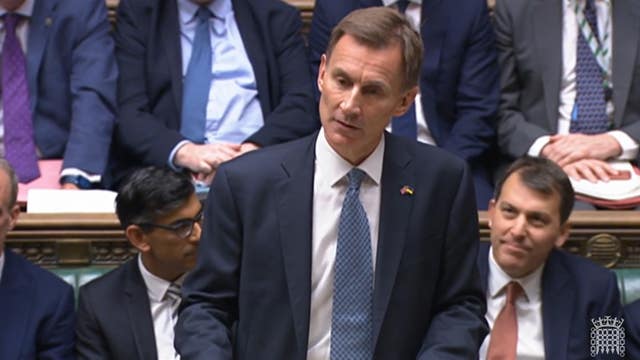
Vanessa Feltz 3pm - 6pm
17 November 2022, 15:54

The Chancellor rejected calls to put VAT on independent school fees, saying it would be like “giving with one hand and taking away with another”.
Billions more will be invested in schools in England over the next two years, the Chancellor has announced as he described ensuring a good education for children as an economic and moral mission.
Jeremy Hunt said the Government will invest an extra £2.3 billion per year in schools over the next two years.
School leaders’ organisations generally welcomed the funding pledge, but warned the sector still faces various challenges including “a teacher recruitment and retention crisis”.
Announcing the rise in funding during the autumn statement on Thursday, Mr Hunt said “thank you” to heads, teachers and classroom assistants for their “brilliant work” which he said must continue in the current “difficult economic circumstances”.

He rejected calls to put VAT on independent school fees, saying it would be like “giving with one hand and taking away with another”.
He said while it could raise about £1.7 billion to increase core funding for schools, some estimates showed it could also result in up to 90,000 children switching from the independent sector to state schools.
He said the extra £4.6 billion over the next two years was a practical move, as opposed to an ideological one, adding that the Government wanted to see school standards rising “for every single child”.
Labour shadow chancellor Rachel Reeves questioned Mr Hunt’s comment.
Speaking in the Commons in response to his statement, she said: “Why do the Tories have an ideological objection to putting VAT on school fees which the Chancellor himself admits will raise £1.7 billion?”
Private schools – also known as independent schools – are exempt from VAT.
Mr Hunt said he remains concerned “that not all school leavers get the skills they need for a modern economy”.
He said: “As Chancellor, I want to know the answer to one simple question – will every young person leave the education system with the skills they would get in Japan, Germany or Switzerland?”
He said he had appointed Sir Michael Barber to advise on the implementation of the Government’s skills reform programme.
Schools leaders largely welcomed Mr Hunt’s announcements as “positive news for education”, but warned that the extra investment comes in the context of educational institutions having endured “a decade of real-terms cuts”.
Geoff Barton, general secretary of the Association of School and College Leaders (ASCL), highlighted other issues facing the education sector including “a teacher recruitment and retention crisis” which he said is largely down to pay.
He said: “However, the devil tends to be in the detail and we’ll be closely looking at the figures to fully understand the implications.
“In particular, we’ll be looking at where this leaves special educational needs and post-16 provision which are both facing extraordinarily difficult financial circumstances.
“We recognise this commitment to education is made in the context of a bleak economic picture but, to put it into perspective, this comes after a decade of real-terms cuts to schools and colleges.”
Mr Barton said the Government must develop a plan “which has more investment in education at its heart because this is crucial to ensure we have a workforce with the skills and knowledge to deliver that goal”.
Paul Whiteman, general secretary of school leaders’ union NAHT, said they hoped the extra money could “help bring schools back from the cliff edge that they have been teetering on”.
He cautioned that schools are not “completely off the hook” as they continue to face “a myriad of pressures”.
He said: “Inflationary pressures are still predicted to rise, with support for energy bills only guaranteed until April. The demand for support for special educational needs is huge and core school funding isn’t enough to solve it.
“And we still have a serious recruitment and retention crisis which this does not solve – this doesn’t go far enough to restore teachers’ and school leaders’ pay after a decade of erosion.”
The financial pledge will not end the “funding crisis gripping our schools and colleges”, according to teachers’ union NASUWT.
General secretary Dr Patrick Roach said the announcement still “leaves a multibillion-pound real-terms funding gap in school and college budgets”.
He said: “The Government cannot claim to be pro-education when it continues to preside over real-terms cuts to school and college budgets and the loss of dedicated teachers and headteachers.
“Warm words from the Chancellor won’t help. Teachers and pupils deserve better.”